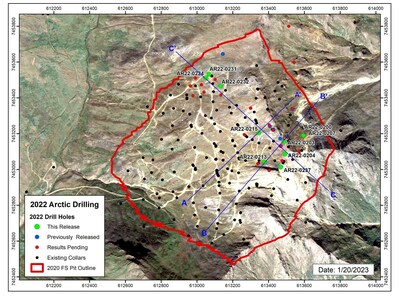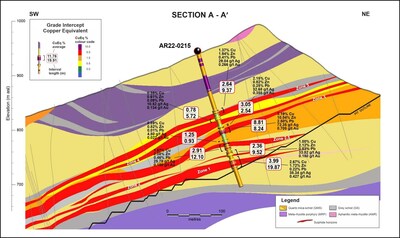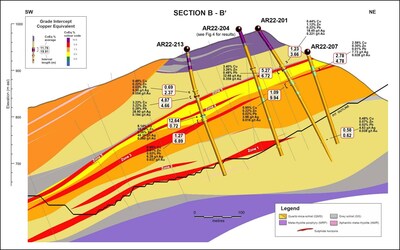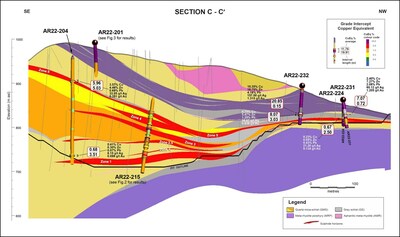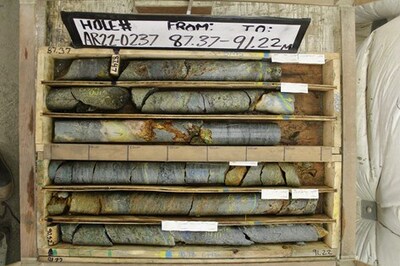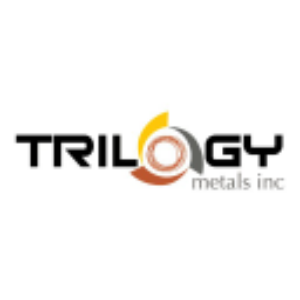Trilogy Metals Announces Additional Results from the 2022 Drill Program at the Arctic Project in Alaska
Rhea-AI Summary
Trilogy Metals has announced positive drilling results from its 2022 program at the Upper Kobuk Mineral Projects in Alaska, revealing multiple high-grade polymetallic mineralization intercepts. Highlights include 8.24 meters with a copper equivalent grade of 8.81% and significant intersections across several drill holes. Overall, 10,738 meters were drilled, focusing on the Arctic deposit. The company is also progressing on the Ambler Access Project, which would enhance mining capabilities. This update indicates strong continuity in mineralization and the potential for further positive results from ongoing assays.
Positive
- High-grade mineralization results with intercepts up to 8.81% copper equivalent.
- A total of 10,738 meters drilled in the 2022 program, a record for Arctic.
- Ongoing assays expected to continue yielding positive results for further exploration.
Negative
- None.
News Market Reaction 1 Alert
On the day this news was published, TMQ declined 1.64%, reflecting a mild negative market reaction.
Data tracked by StockTitan Argus on the day of publication.
Multiple Intercepts of High-Grade Polymetallic Mineralization, Including 8.24 Meters with a Copper Equivalent Grade of
Update on Ambler Access Project
VANCOUVER, BC, Jan. 25, 2023 /PRNewswire/ - Trilogy Metals Inc. (TSX: TMQ) (NYSE American: TMQ) ("Trilogy" or the "Company") is pleased to announce the second set of drilling results from the 2022 summer field season at the Upper Kobuk Mineral Projects ("UKMP") located in northwestern Alaska. In addition, the Company is providing an update on the Ambler Access Project – the proposed 211-mile, industrial-use-only road from the UKMP to the Dalton Highway that will enable advancing exploration and development at the Ambler Mining District.
The UKMP includes the Arctic (volcanogenic massive sulphide, or "VMS") deposit ("Arctic"), the Bornite (carbonate-hosted copper, or "CHC") deposit ("Bornite"), and prospective mining claims in the surrounding area. The drill program was completed by Ambler Metals LLC ("Ambler Metals"), the joint venture operating company equally owned by Trilogy and South32 Limited (ASX, LSE, JSE: S32; ADR: SOUHY) ("South32").
The 2022 field program included 10,738 meters of diamond drilling, of which 8,376 meters was drilled at Arctic, the most ever drilled at Arctic in a single field season, while the remainder of the meterage was used on regional targets in the Ambler VMS Belt and near Bornite. The 2022 field program prioritized advancing Arctic with additional infill drilling to further improve the confidence in the mineral resource and for geotechnical studies to further de-risk the project.
On November 29, 2022, the Company released the first assay results from the 2022 field program at Arctic, including four infill holes (AR22-0191, 0192, 0193, and 0195) and three geotechnical holes (AR22-0194, 0196 and 0197). For more information on these drill results, please visit the Company's website at https://trilogymetals.com/news-and-media/news/.
This release covers an additional 10 holes comprising eight infill and two geotechnical. The infill holes are from two areas of the Arctic deposit – three holes from the northern edge of the Arctic deposit and five holes from the eastern part of the deposit (see Figure 1).
Significant intersections of high-grade copper, zinc, lead, gold, and silver mineralization include:
- Hole AR22-0201: 6.72 meters of
3.40% copper,3.26% zinc,0.48% lead, 0.358 g/t gold and 32.66 g/t silver for a copper equivalent grade of5.27% . - Hole AR22-0204: 5.03 meters of
3.57% copper,4.46% zinc,0.69% lead, 0.351 g/t gold and 33.05 g/t silver for a copper equivalent grade of5.96% . - Hole AR22-0213: 4.66 meters of
3.22% copper,3.22% zinc,0.28% lead, 0.194 g/t gold and 28.90 g/t silver for a copper equivalent grade of4.87% . - Hole AR22-0215: 8.24 meters of
3.19% copper,10.04% zinc,2.50% lead, 0.705 g/t gold and 72.35 g/t silver for a copper equivalent grade of8.81% , and 19.87 meters of2.67% copper,1.72% zinc,0.22% lead, 0.427 g/t gold and 38.34 g/t silver for a copper equivalent grade of3.99% . - Hole AR22-0232: 3.03 meters of
4.70% copper,5.47% zinc,1.35% lead, 0.636 g/t gold and 56.67 g/t silver for a copper equivalent grade of8.07% . - Hole AR22-0237: 10.00 meters of
3.73% copper,2.54% zinc,0.42% lead, 0.067 g/t gold and 47.95 g/t silver for a copper equivalent grade of5.66% .
Tony Giardini, President and CEO of Trilogy, commented, "As expected, the 2022 infill drill program continues to yield high grades of copper, zinc and precious metals, demonstrating the continuity of the high-grade zones of these metals at Arctic. The assay lab is going full steam ahead as we anticipate an ongoing flow of results in the near future, not only from Arctic but also from the nearby Ambler Belt and Cosmos Hills areas."
Richard Gosse, Vice President, Exploration at Trilogy, stated, "We are pleased with these additional infill drill results where grades and thicknesses continue to compare well with our resource model. It is very encouraging to see the model perform so well, especially as these infill holes are designed to test areas that were identified as having the potential for greater variance."
Mineralized intervals of high-grade mineralization at a cut-off of
The drill results contained in this news release are from 10 drill holes from the 2022 Arctic drill program, which include eight infill holes (AR22-0201, 0204, 0213, 0215, 0224, 0231, 0232 and 0237) and two geotechnical holes (AR22-0200 and 0207). All drill holes are sized HQ3 (63.5 mm diameter). The 2022 Arctic infill program was designed to increase confidence from Indicated to Measured in areas of the mineral resource block model that would be mined during the first four years of production, based on Trilogy's 2020 Arctic feasibility study1 mine plan and with the highest estimated metal value.
Results indicate mineralization is reasonably continuous, especially in Zone 5 which typically contains higher grades and most consistent thicknesses at Arctic.
Within the Arctic deposit, mineralization occurs as stratiform semi-massive sulphide to massive sulphide beds within primarily graphitic to chloritic schists and fine-grained quartz schists. Sulphide mineralogy is similar for all intercepts: chalcopyrite, sphalerite and galena.
_______________________ |
1 National Instrument 43-101 technical report titled "Arctic Feasibility Study Alaska, USA NI 43-101 Technical Report" with an effective date of August 20, 2020 and a release date of October 2, 2020 (the "2020 Feasibility Study") |
Geotechnical holes AR22-0200 and 0207 were drilled to further define the talc horizon in the eastern pit wall. Hole AR22-0200 was abandoned and redrilled at 0207; both holes intersected Zone 4 mineralization as anticipated.
Table 1. Drill intercepts from the 2022 Arctic infill drilling program.
Hole | From | To (m) | Length | Au | Ag | Cu | Pb | Zn | CuEq | Ba | Zone |
AR22- | 31.74 | 40.19 | 8.45 | 0.016 | 6.82 | 1.69 | 0.04 | 0.84 | 2.08 | 0.01 | 4 |
AR22- | 89.33 | 92.99 | 3.66 | 0.221 | 18.45 | 0.44 | 0.22 | 1.12 | 1.23 | 4.55 | 7 |
97.23 | 103.95 | 6.72 | 0.358 | 32.66 | 3.40 | 0.48 | 3.26 | 5.27 | 3.96 | 5 | |
129.56 | 139.50 | 9.94 | 0.016 | 3.98 | 0.95 | 0.02 | 0.22 | 1.09 | 0.03 | 3 | |
278.30 | 278.92 | 0.62 | 0.039 | 4.63 | 0.48 | 0.02 | 0.07 | 0.58 | 0.06 | Sub 1 | |
AR22- | 85.00 | 90.03 | 5.03 | 0.351 | 33.05 | 3.57 | 0.69 | 4.46 | 5.96 | 2.59 | 5 |
263.03 | 266.54 | 3.51 | 0.099 | 8.15 | 0.41 | 0.07 | 0.30 | 0.68 | 1.87 | 1 | |
AR22- | 37.19 | 41.97 | 4.78 | 0.028 | 7.73 | 2.58 | 0.01 | 0.30 | 2.78 | 0.02 | 4 |
AR22- | 86.70 | 89.07 | 2.37 | 0.054 | 9.50 | 0.48 | 0.03 | 0.22 | 0.69 | 3.33 | 7 |
97.34 | 102.00 | 4.66 | 0.194 | 28.90 | 3.22 | 0.28 | 3.22 | 4.87 | 1.86 | 5 | |
144.48 | 145.20 | 0.72 | 0.260 | 48.30 | 8.14 | 0.36 | 10.30 | 12.64 | 0.01 | 3 | |
151.11 | 158.00 | 6.89 | 0.037 | 6.29 | 0.95 | 0.02 | 0.61 | 1.27 | 0.05 | 3 | |
AR22- | 108.44 | 117.81 | 9.37 | 0.266 | 29.04 | 1.37 | 0.41 | 1.94 | 2.64 | 4.86 | 5 |
121.08 | 126.80 | 5.72 | 0.134 | 10.52 | 0.35 | 0.09 | 0.61 | 0.78 | 0.43 | 4 | |
140.33 | 142.87 | 2.54 | 0.358 | 32.68 | 2.15 | 0.25 | 0.82 | 3.05 | 0.69 | ? | |
146.14 | 154.38 | 8.24 | 0.705 | 72.35 | 3.19 | 2.50 | 10.04 | 8.81 | 0.48 | 3 | |
165.80 | 166.73 | 0.93 | 0.022 | 4.80 | 0.89 | 0.01 | 0.82 | 1.25 | 0.00 | 2.5 | |
173.39 | 185.49 | 12.10 | 0.150 | 25.78 | 1.67 | 0.46 | 2.08 | 2.91 | 0.73 | 2.5 | |
188.80 | 198.32 | 9.52 | 0.180 | 33.52 | 1.00 | 0.53 | 2.12 | 2.36 | 2.73 | 2 | |
204.60 | 224.47 | 19.87 | 0.427 | 38.34 | 2.67 | 0.22 | 1.72 | 3.99 | 0.69 | 1 | |
AR22- | 34.14 | 36.64 | 2.50 | 0.134 | 21.20 | 0.23 | 0.43 | 0.05 | 0.67 | 0.66 | 5/1 |
AR22- | 30.97 | 31.69 | 0.72 | 1.205 | 60.12 | 2.40 | 2.08 | 7.27 | 7.07 | 1.55 | 5/1 |
AR22- | 62.58 | 62.73 | 0.15 | 1.315 | 157.00 | 10.35 | 4.18 | 18.70 | 20.85 | 4.72 | 5 |
66.16 | 69.19 | 3.03 | 0.636 | 56.67 | 4.70 | 1.35 | 5.47 | 8.07 | 5.73 | 1 | |
AR22- | 83.00 | 93.00 | 10.00 | 0.670 | 47.95 | 3.73 | 0.42 | 2.54 | 5.66 | 0.52 | 5 |
Notes:
- Copper equivalent (CuEq) calculations use metal prices assumptions of
$3.00 /lb for copper,$1.10 /lb for zinc,$1.00 /lb for lead,$1,300 /oz for gold, and$18.00 /oz for silver. - Results are core intervals and not true thickness; true widths have not been determined for the above intercepts but are believed to be greater than
80% of actual drill thicknesses. - Cut-off grade of
0.5% CuEq. - Maximum internal dilution of up to three consecutive meters of <
0.5% CuEq. - Within mineralized zones the minimum sample length was 0.29 m, maximum sample length was 2.50 m, and the average sample length was 0.98 m.
- Core recovery averaged
84% . - No core recovery between the reported intercepts in AR22-0232, between 62.73 to 66.16 meters.
- No core recovery in the 2.60 meters immediately prior to the reported intercept in hole AR22-0224, between 31.54 to 34.14 meters.
- Some rounding errors may occur.
Hole | Easting | Northing | Elevation | Azimuth | Dip | Length (m) |
AR22-0200 | 613594.96 | 7453192.51 | 937.47 | 35 | -70 | 48.62 |
AR22-0201 | 613484.91 | 7453154.61 | 987.60 | 35 | -50 | 325.53 |
AR22-0204 | 613492.30 | 7453086.11 | 986.94 | 35 | -75 | 285.59 |
AR22-0207 | 613595.33 | 7453191.44 | 937.51 | 35 | -70 | 205.74 |
AR22-0213 | 613378.03 | 7453042.66 | 942.62 | 80 | -80 | 283.46 |
AR22-0215 | 613345.50 | 7453204.65 | 940.85 | 35 | -70 | 258.17 |
AR22-0224 | 613049.00 | 7453513.24 | 851.65 | 35 | -70 | 54.86 |
AR22-0231 | 613067.57 | 7453532.01 | 858.87 | 35 | -70 | 61.42 |
AR22-0232 | 613133.35 | 7453466.26 | 892.02 | 35 | -70 | 89.92 |
AR22-0237 | 613469.00 | 7453014.00 | 977.00 | 110 | -45 | 169.77 |
Coordinates are in UTM Zone 4N (meters) coordinate system, NAD83 Datum.
On November 15, 2022, the United States Bureau of Land Management ("USBLM") submitted a status report announcing the anticipation of publishing a draft Supplemental Environmental Impact Statement ("SEIS") in the second quarter of calendar 2023 and a final SEIS in the fourth quarter of calendar 2023. On January 17, 2023, the USBLM submitted a status report reaffirming the timing of the draft and final SEIS.
In September 2022, U.S. Senators Lisa Murkowski and Dan Sullivan, both R-Alaska, and U.S. Representative Mary Peltola, D-Alaska, wrote to Interior Secretary Deb Haaland in a bi-partisan show of support for the road. Senators Murkowski and Sullivan urged prompt re-approval of the road, while Representative Peltola reiterated the potential economic benefits the road could bring to area residents, the state and the nation, and to also encourage the timely completion of its approval process. In November 2022, Senators Murkowski and Sullivan wrote a second letter to Interior Secretary Haaland to reiterate their support for the road, stressing that further delay in its approval process would be a risk to Alaskan jobs, and U.S. economic and national security due to prolonged reliance on foreign sources of supply of minerals and metals needed for renewable energy infrastructure and modern defense systems.
The drilling program, sampling and assaying protocol, and data verification were managed by qualified persons (QPs) employed by Ambler Metals. The diamond drill holes were completed using HQ3 diameter core, and recoveries averaged
Samples were collected through mineralized zones using a 0.29 m minimum length and 2.50 m maximum length; average sample length is 0.98m. Weights of the drill core samples range from 0.72 to 11.46 kg, depending on the size of core, rock type, and recovery.
Each core sample was placed into a bag with a numbered tag and quality control samples were inserted between core samples using the same numbering sequence. Then, samples were grouped into batches for shipping and laboratory submissions. Each batch of 20 samples contains quality control (QC) samples that comprise one certified reference material (CRM), one core blank (BLK), and one crushed or pulp duplicate (DUP). In addition, 1 field duplicate was taken within mineralized intervals for every 20 samples. Chain of custody records are maintained for sample shipments and the custody is transferred from Ambler Metals expeditor to the laboratory upon delivery.
Samples were shipped to ALS Minerals laboratory in Fairbanks, Alaska, USA, for sample submission. ALS Minerals Fairbanks is a satellite sample preparation facility accredited under ALS Minerals. The ALS Minerals Fairbanks shipped the samples to ALS Minerals in North Vancouver, B.C., Canada, for sample preparation and analysis. ALS Minerals North Vancouver is an independent laboratory certified under ISO 9001:2008 and accredited under ISO/IEC 17025:2005 by the Standards Council of Canada. Selected sample batches were sent to ALS Minerals laboratory in Vientiane, Laos for fire assay. ALS Minerals includes its own internal quality control samples comprising certified reference materials, blanks, and pulp duplicates.
Drill core samples were weighed (WEI-21), dried if excessively wet (DRY-21), coarse jaw crushed to
Gold analyses were completed using a 30 g lead fire assay and AAS finish (Au-AA23). Multi-element analyses for 48 elements were completed using a geochemical four acid digestion and ICP-ES/MS finish (ME-MS61). Over-range assays for Ag, Cu, Zn, and S were completed using an ore grade four-acid digestion and ICP-ES finish (ME-OG62). Additional analyses were completed for Ba and Hg.
Au, Ag, Cu, Pb, and Zn assays for QC samples were reviewed to ensure that CRMs are within tolerance limits specified on supplier certificates, BLKs are below acceptable thresholds, and DUPs display statistical patterns normally expected for sample types, methods, and elements. CRMs that returned assays outside of tolerance limits and BLKs with assays above thresholds were deemed to have failed. Sample batches containing failed QC samples were re-assayed to ensure that the QC samples returned acceptable results before release. All QC monitoring data are reviewed and signed off by an independent QA/QC geologist.
There is no known relationship between core sample recoveries and assay grades. Ambler Metals will submit
Richard Gosse, P.Geo., Vice President, Exploration for Trilogy, is a Qualified Person as defined by National Instrument 43-101. Mr. Gosse has reviewed the scientific and technical information in this news release and approves the disclosure contained herein.
Trilogy Metals Inc. is a metal exploration and development company that holds a 50 percent interest in Ambler Metals LLC which has a 100 percent interest in the Upper Kobuk Mineral Projects in Northwestern Alaska. On December 19, 2019, South32, a globally diversified mining and metals company, exercised its option to form a 50/50 joint venture with Trilogy. The UKMP is located within the Ambler Mining District, one of the richest and most-prospective known copper-dominant districts in the world. It hosts world-class polymetallic volcanogenic massive sulphide deposits that contain copper, zinc, lead, gold and silver, and carbonate replacement deposits that have been found to host high-grade copper and cobalt mineralization. Exploration efforts have been focused on two deposits in the Ambler Mining District – the Arctic VMS deposit and the Bornite carbonate replacement deposit. Both deposits are located within a land package that spans approximately 190,929 hectares. Ambler Metals has an agreement with NANA Regional Corporation, Inc., an Alaska Native Corporation that provides a framework for the exploration and potential development of the Ambler Mining District in cooperation with local communities. Trilogy's vision is to develop the Ambler Mining District into a premier North American copper producer while protecting and respecting subsistence livelihoods.
This press release includes certain "forward-looking information" and "forward-looking statements" (collectively "forward-looking statements") within the meaning of applicable Canadian and United States securities legislation including the United States Private Securities Litigation Reform Act of 1995. All statements, other than statements of historical fact, included herein, including, without limitation, statements relating to interpretation of drill results; the Company's beliefs regarding the potential of the Upper Kobuk Mineral Projects; and the Company's expectations regarding de-risking of the Upper Kobuk Mineral Projects are forward-looking statements. Forward-looking statements are frequently, but not always, identified by words such as "expects", "anticipates", "believes", "intends", "estimates", "potential", "possible", "poised" and similar expressions, or statements that events, conditions, or results "will", "may", "could", "would" or "should" occur or be achieved. Forward-looking statements involve various risks and uncertainties. There can be no assurance that such statements will prove to be accurate, and actual results and future events could differ materially from those anticipated in such statements. Important factors that could cause actual results to differ materially from the Company's expectations include the uncertainties involving success of exploration, permitting timelines, requirements for additional capital, government regulation of mining operations, environmental risks, unanticipated reclamation expenses, supplies and services the interpretation of drill results, the need for additional financing to explore and develop properties and availability of financing in the debt and capital markets; uncertainties involved in the interpretation of drilling results and geological tests; the need for cooperation of government agencies and native groups in the development and operation of properties; the need to obtain permits and governmental approvals; unanticipated variation in geological structures, metal grades or recovery rates; unexpected cost increases, which could include significant increases in estimated capital and operating costs; fluctuations in metal prices and currency exchange rates and other risks and uncertainties disclosed in the Company's Annual Report on Form 10-K for the year ended November 30, 2021 filed with Canadian securities regulatory authorities and with the United States Securities and Exchange Commission and in other Company reports and documents filed with applicable securities regulatory authorities from time to time. Copy of Company's Form 10-K may be obtained at no charge by visiting our Investors website at www.trilogymetals.com, the SEC's website at www.sec.gov or at www.sedar.com. The Company's forward-looking statements reflect the beliefs, opinions and projections on the date the statements are made. The Company assumes no obligation to update the forward-looking statements or beliefs, opinions, projections, or other factors, should they change, except as required by law.
![]() View original content to download multimedia:https://www.prnewswire.com/news-releases/trilogy-metals-announces-additional-results-from-the-2022-drill-program-at-the-arctic-project-in-alaska-301730090.html
View original content to download multimedia:https://www.prnewswire.com/news-releases/trilogy-metals-announces-additional-results-from-the-2022-drill-program-at-the-arctic-project-in-alaska-301730090.html
SOURCE Trilogy Metals Inc.








